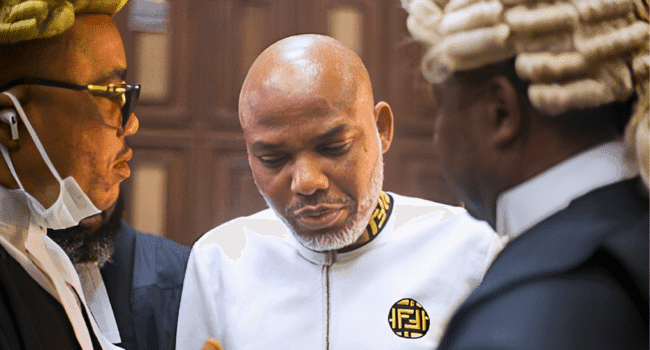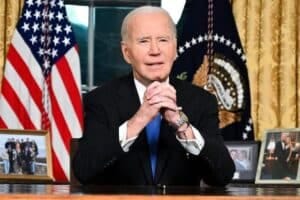The courtroom in Abuja fell silent as a key witness in the Kanu trial dropped a heavy claim—the Eastern Security Network (ESN) is illegal, but Amotekun, a similar security outfit in the South-West, has legal backing. This statement came during a re-examination led by the prosecution’s top lawyer, Adegboyega Awomolo (SAN).
The witness, using the codename “BBB,” explained that Amotekun was created legally. The South-West states passed laws through their Houses of Assembly to bring it to life. But ESN, according to him, had no such legal birth. This was the core of the argument—that one group followed the rule of law, while the other did not.
He also said the head of Nigeria’s Department of State Services (DSS) once supported community policing. But the key point was that such efforts must be approved and guided by existing security bodies. No group should take the law into their own hands.
The courtroom had earlier seen the defence team, led by Paul Erokoro (SAN), submit three videos as evidence. These clips, stored on a flash drive, were shown to everyone present.
One video showed the DSS Director-General giving a speech. He told Nigerians that communities need to build their first line of defence to protect themselves from rising insecurity. But he also made it clear—any form of local security must operate under the guidance of the official security forces.
He was heard saying, “We can’t deploy officers to every corner of the country. That’s why we must get local people involved. But they must act with permission and under our control.” See more on this
When asked by the defence lawyer if this meant the DSS was asking communities to bear arms, the witness disagreed. He stressed that the DG’s words pointed to a structured, supervised plan—not a free-for-all.
Another video played during the trial featured General Theophilus Danjuma. He was speaking at a public event, and in the footage, he suggested that some members of Nigeria’s armed forces were not being neutral in violent events across the country.
Erokoro then asked the witness to interpret the general’s words. But the witness didn’t take the bait. “That question is for General Danjuma himself,” he replied, dodging the possible political landmine.
In the third video, Imo State Governor Hope Uzodinma appeared, visibly disturbed as he spoke about violent killings in his state. He hinted that politicians might be behind the crisis but didn’t name names.
The defence team pushed back, asking if Uzodinma’s words contradicted the DSS claims that the Indigenous People of Biafra (IPOB) were the cause of the violence in Orlu. But the witness stood his ground. He said the DSS investigations had identified those killed by suspected IPOB members. “The governor didn’t name names. We did,” he added.
He also reminded the court that IPOB was banned by a court and that Nnamdi Kanu was still a part of it—even after it was outlawed.
Then the discussion shifted to the famous EndSARS protests. The witness said he knew the protests were sparked by public calls to scrap SARS, a controversial police unit. He added that several panels were set up in states like Lagos, with support from the National Human Rights Commission (NHRC), to look into what happened.
He confirmed that the Lagos panel’s report never accused IPOB of being part of the protests or tagging them as terrorist acts. The report was later admitted into evidence during the hearing.

The court, led by Justice James Omotosho, later told the prosecution to wrap up their side of the trial in six days. The defence would then have nine days to present their own case.
Everyone agreed, and the judge set fresh hearing dates for May 28 and 29, and June 6, 16, 18, and 19.
This case, filled with legal turns and political undercurrents, continues to stir public interest. The trial not only questions whether ESN is illegal or not, but also shines a light on how Nigeria treats homegrown security efforts, depending on who is behind them.
As more witnesses take the stand and more evidence is brought to light, one thing is certain—the Kanu trial isn’t just about one man. It’s about the law, its limits, and how Nigeria chooses to define justice and security.
Whether one supports Kanu or not, the courtroom is where the truth, or something close to it, is being pieced together. And the contrast between ESN and Amotekun is central to this narrative.


